Chornobyl Report
A biweekly update of Chornobyl support activities for June 26, 1998
Ventilation stack regains full design strength
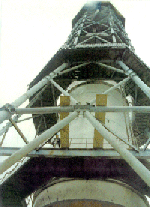 The repaired ventilation stack in all its glory. |
Completion of the ventilation stack repairs mark the first significant physical safety improvement at the Chornobyl Nuclear Power Plant (ChNPP) since the 1986 accident. The project was funded jointly by the U.S. Department of Energy, Canada, and Ukraine. Structural analysis, repair design, contracting, and project management activities were performed by Ukrainian organizations.
To commemorate this significant milestone, ChNPP officials are planning an on-site event in mid-July that will involve dignitaries from all three countries that funded the repair work.
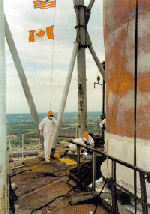 Chornobyl workers perform final on-site welding. |
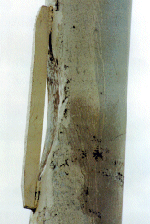 Reinforcement of a damaged structural element. | 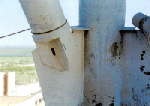 Lower junctions of the replacement brace. |
PMU forges ahead on Shelter work
The Chornobyl Shelter Project Management Unit (PMU) continues to solidify its team in Slavutych. Efforts include developing program management plans and procedures; arranging for office space; coordinating communications, transportation, and other logistical needs; and securing housing for the PMU consultant staff.
In parallel, PMU teams of experts are evaluating proposals submitted by industry representatives on four Early Biddable Project (EBP) Packages. The purpose of the EBPs is to maintain project momentum during the mobilization and planning stages of the PMU. The EBPs involve preparing studies, collecting and evaluating data, preparing conceptual designs, and performing assessments that support key Shelter Project decisions and infrastructure development.
The following outlines the current status of the EBP evaluation process.
Package A - Civil Engineering Projects: Evaluations are complete, and negotiations are in progress with the candidate contractor at this time. Announcement of the contractor is expected by the end of June.
Package B - Operations and Monitoring: Evaluations are complete, and recommendation for the candidate contractor is awaiting approval by the European Bank for Reconstruction and Development (EBRD). Negotiations are expected to begin soon, with a contract award anticipated in early July.
Package C - Emergency Systems: Evaluations have been completed and submitted to the EBRD for approval in late June. Expectations are that the contract will be awarded in July.
Package D - Fuel Containing Material Management: Evaluations began this month, and the contract is expected to be awarded in late July or early August.
The PMU also is reviewing Ukrainian Shelter projects planned, proposed, and, in some cases, on hold while ChNPP management determines the projects' potential for inclusion in the overall Shelter Project.
Equipment continues to clear customs
Fall-protection devices to be used for industrial safety purposes at ChNPP recently cleared Ukrainian customs for site delivery. Anti-contamination coveralls and automated thermoluminescent dosimeters used to measure personnel radiation exposure also have been released by customs and delivered to ChNPP.
Additional industrial safety and radiation protection equipment remains in customs.
Slavutych Laboratory hosts international seminar
The Slavutych Laboratory for International Research and Technology was host this week to an international seminar on Environmentally Assisted Cracking of Nuclear Power Plant Austenitic Piping. Austenitic, or stainless, steel is commonly used in nuclear power plants because of its low corrosion properties.
Nuclear industry representatives from the United States, Germany, Switzerland, Sweden, Spain, Russia, and Ukraine, including engineering staff from ChNPP, participated in the week-long seminar, which was funded by the International Atomic Energy Agency.
New satellite tower to upgrade Slavutych Laboratory communications
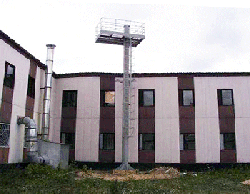 Tower at the Slavutych Laboratory. |
The receiver will be moved to its permanent location next week, and improved satellite communications are expected shortly thereafter.
See also the Biweekly Report Archives and Chornobyl Initiatives/General Information on Chornobyl